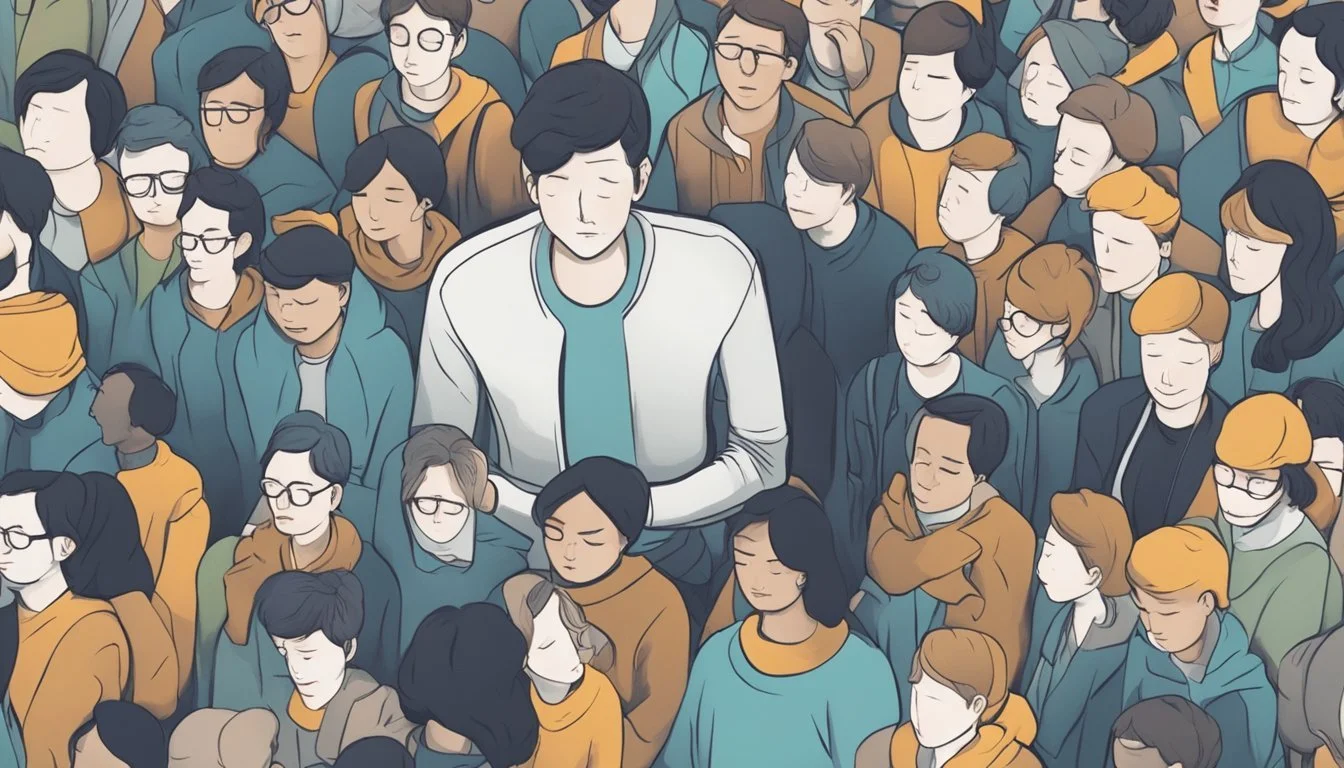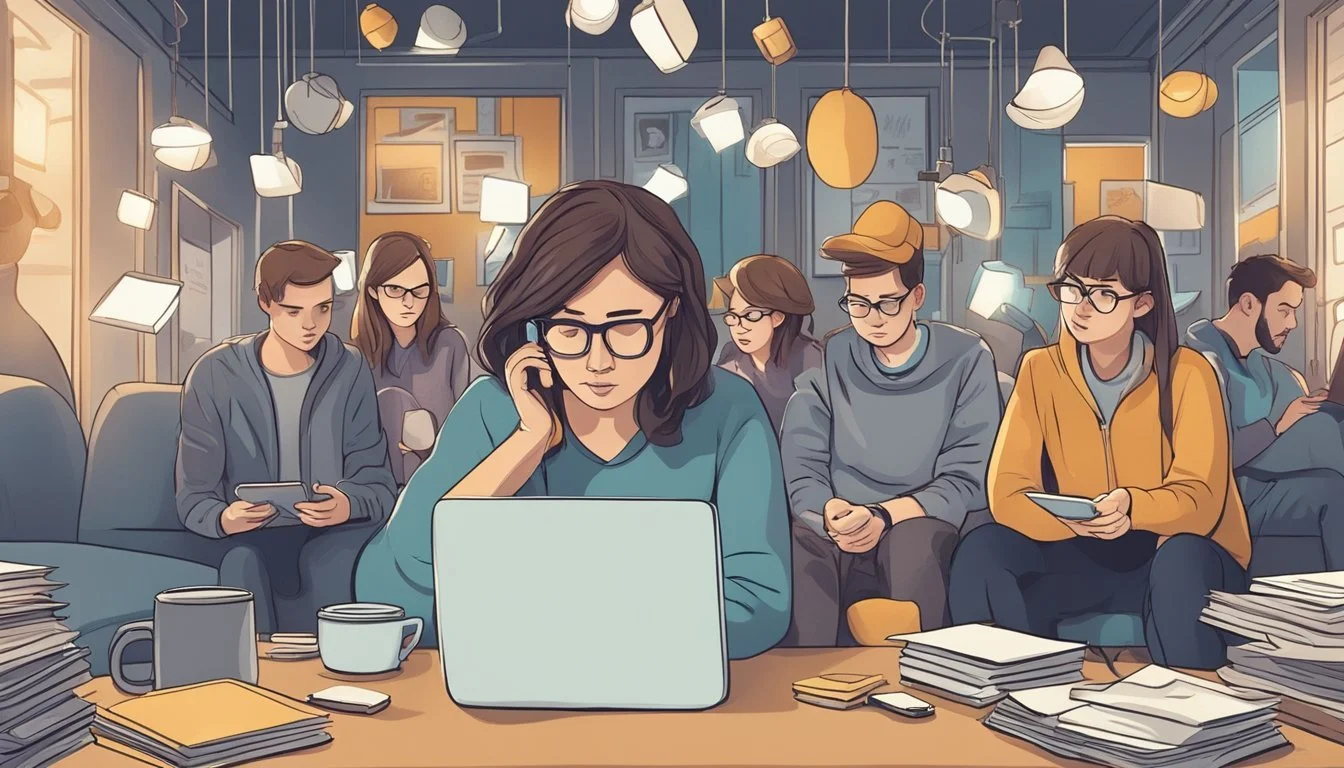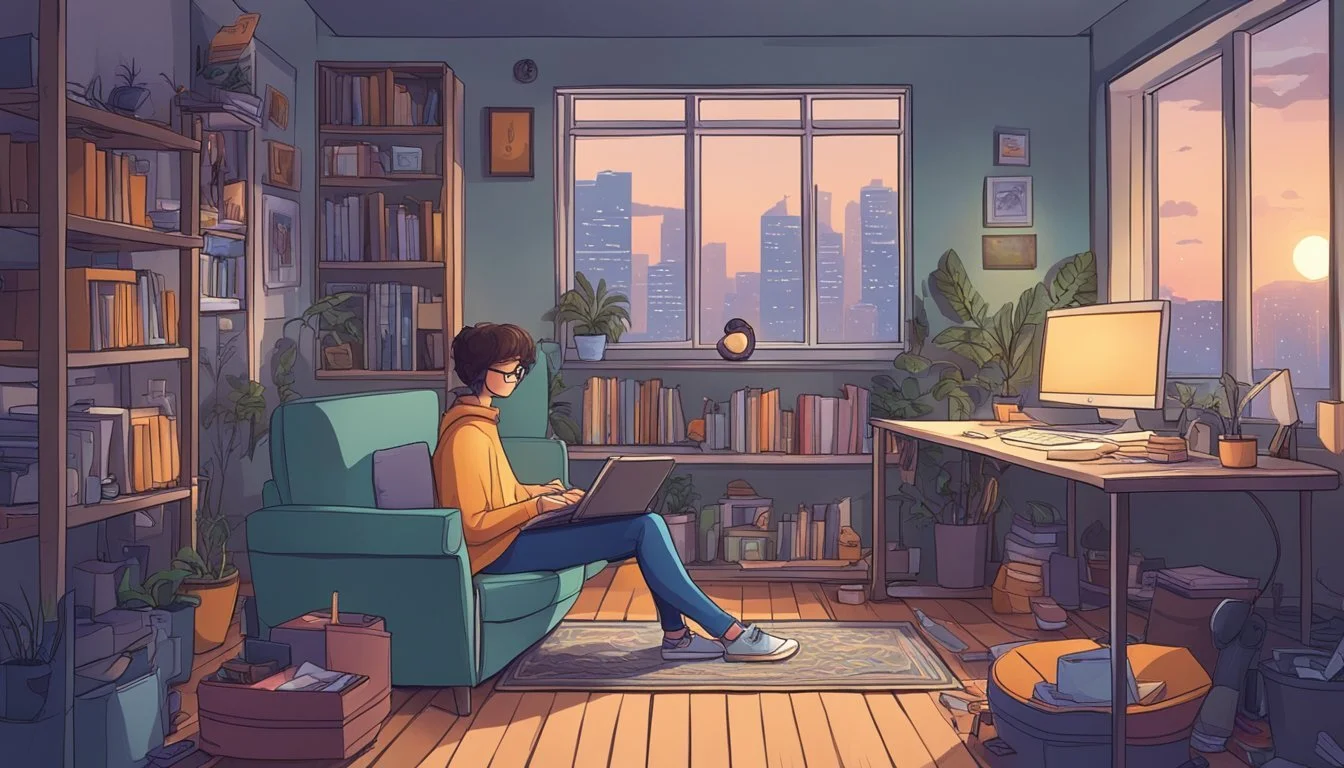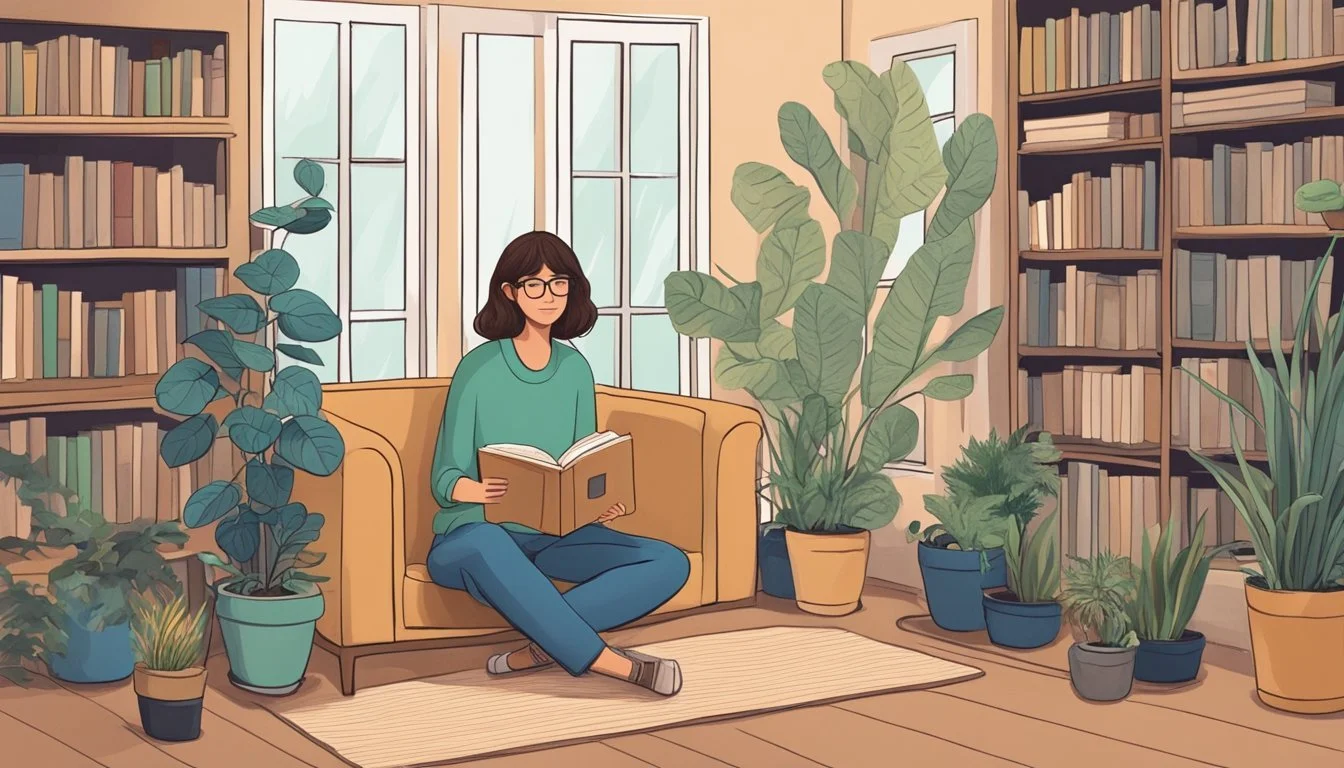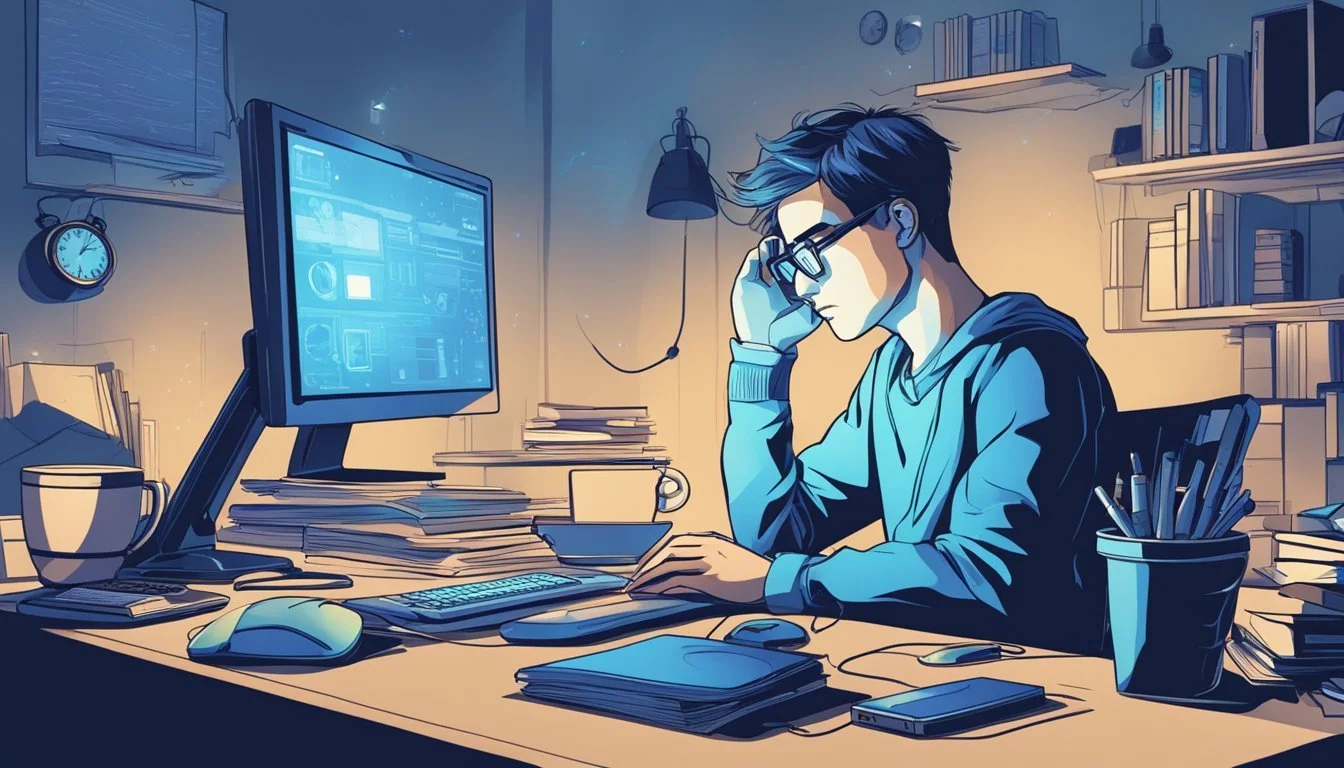12 Habits That Can Drain an Introvert's Energy
Recognizing and Avoiding Social Burnout
Introverts experience the world differently from their extroverted counterparts. While social interactions energize extroverts, they can leave introverts feeling drained and in need of solitude to recharge. This unique trait affects various aspects of an introvert's daily life, influencing their preferences and behaviors.
Understanding the specific habits and situations that deplete an introvert's energy is crucial for maintaining their well-being and productivity. By identifying these energy-draining factors, introverts can develop strategies to manage their social interactions and environments more effectively. This awareness allows them to create a balance between necessary social engagements and the restorative alone time they require to thrive.
1) Overcommitting to Social Events
Introverts often find themselves drained when they agree to attend too many social gatherings. The pressure to be present and engage with others can be overwhelming for those who recharge through solitude.
Social events require introverts to expend considerable mental and emotional energy. Large gatherings, parties, and networking mixers can be particularly taxing, as they involve interacting with numerous people simultaneously.
Introverts may feel obligated to accept invitations out of politeness or fear of missing out. This can lead to a packed social calendar that leaves little time for the quiet reflection they need to recharge.
The constant stimulation from multiple social engagements can result in fatigue and irritability. Introverts may find themselves struggling to be present and engaged as their energy reserves deplete.
To maintain their well-being, introverts should carefully consider their social commitments. Limiting the number of events and spacing them out allows for adequate recovery time between social interactions.
2) Ignoring Personal Boundaries
Introverts often struggle with setting and maintaining personal boundaries, which can lead to energy depletion. When they fail to communicate their limits clearly, others may unknowingly encroach on their personal space or time.
This can manifest in various ways, such as agreeing to social engagements when they need alone time or allowing interruptions during focused work periods. Introverts may find it challenging to say no to requests, even when they feel overwhelmed.
Ignoring boundaries can result in excessive socializing, constant interruptions, or taking on too many responsibilities. These situations force introverts to expend more energy than they can comfortably manage.
To preserve their energy, introverts need to recognize their limits and communicate them effectively. This might involve scheduling specific times for socializing, creating quiet spaces at work, or learning to politely decline invitations when necessary.
By respecting their own boundaries, introverts can better manage their energy levels and avoid feeling drained. It's crucial for them to prioritize their needs and create a balance between social interactions and solitude.
3) Constant Interruptions
Introverts often find their energy depleted by frequent disruptions to their work or thoughts. These interruptions can come in various forms, such as coworkers dropping by unannounced or unexpected phone calls.
For introverts, maintaining focus is crucial to their productivity and mental well-being. When their concentration is repeatedly broken, it becomes challenging to regain momentum and stay in a flow state.
Each interruption requires introverts to shift their attention and expend energy to re-engage with the task at hand. This constant switching can lead to mental fatigue and decreased efficiency over time.
Open office environments can be particularly draining for introverts due to the increased likelihood of interruptions. The lack of privacy and constant background noise can make it difficult for them to find the quiet space they need to recharge.
To protect their energy, introverts may benefit from setting boundaries and creating designated periods of uninterrupted work time. Communicating these needs to colleagues and using visual cues, such as headphones or "do not disturb" signs, can help minimize disruptive interactions.
4) Loud and Crowded Spaces
Introverts often find loud and crowded spaces overwhelming and draining. These environments can quickly deplete their energy reserves and leave them feeling exhausted.
Noisy settings like busy restaurants, concerts, or crowded shopping malls can be particularly challenging for introverts. The constant barrage of sounds and stimuli can overload their senses and make it difficult to focus or relax.
Large gatherings of people in confined spaces can also be taxing for introverts. They may feel uncomfortable with the lack of personal space and the need for constant social interaction.
Many introverts prefer quieter, more intimate settings where they can engage in meaningful conversations without feeling overwhelmed. They may opt for smaller gatherings or one-on-one interactions to preserve their energy.
To cope with loud and crowded spaces, introverts might seek out quieter areas or take regular breaks to recharge. Some may choose to limit their time in these environments or plan for recovery periods afterward.
5) Extended Small Talk
Introverts often find prolonged periods of casual conversation mentally taxing. These interactions can quickly deplete their social energy reserves, leaving them feeling drained and overwhelmed.
Small talk typically lacks the depth and meaningful exchange that introverts crave. Instead of energizing them, it can feel like a constant effort to maintain superficial dialogue.
The pressure to keep a conversation going, even when there's little substance, can be particularly draining. Introverts may struggle to come up with topics or feel anxious about potential awkward silences.
Large gatherings or events that require extended periods of small talk can be especially challenging. Introverts may find themselves needing to retreat or "recharge" after such encounters.
While small talk serves important social functions, introverts often prefer more focused, one-on-one conversations about topics that genuinely interest them. These deeper interactions tend to be less draining and more fulfilling for introverted individuals.
6) Multitasking
Introverts often find multitasking particularly draining. While juggling multiple tasks simultaneously can be challenging for anyone, it tends to deplete an introvert's energy reserves more quickly.
The brain uses glucose to fuel its activities, and neurons lack the ability to store extra reserves. When introverts attempt to divide their attention between various tasks, they may rapidly exhaust their mental energy.
Multitasking can create a dopamine-addiction feedback loop, leading introverts to continue despite feeling tired. This cycle can further deplete their energy and leave them feeling overwhelmed.
For introverts, focusing on one task at a time allows for deeper concentration and more efficient use of mental resources. Prioritizing tasks and tackling them sequentially can help preserve energy levels throughout the day.
Recognizing the impact of multitasking on their energy reserves, introverts may benefit from implementing strategies to minimize task-switching. Setting aside dedicated time for specific activities and creating a structured schedule can help maintain focus and reduce mental fatigue.
7) Spending Time With Energy Vampires
Energy vampires are individuals who drain the emotional and mental resources of those around them. These people can be particularly exhausting for introverts, who often have limited social energy to begin with.
Energy vampires may constantly seek attention, complain excessively, or engage in dramatic behavior. They often dominate conversations and leave little room for others to express themselves.
Introverts may find themselves feeling drained after interacting with energy vampires. The constant need to provide emotional support or navigate intense social situations can quickly deplete an introvert's energy reserves.
Some common signs of energy vampires include excessive neediness, constant negativity, and a tendency to create drama. They may also have difficulty respecting personal boundaries and may become upset when others need space.
To protect their energy, introverts can learn to recognize these behaviors and set firm boundaries. This might involve limiting time spent with energy vampires or developing strategies to politely end conversations when feeling overwhelmed.
It's important for introverts to prioritize their own well-being and recognize that it's okay to distance themselves from people who consistently drain their energy. By doing so, they can preserve their limited social energy for more positive and fulfilling interactions.
8) Frequent Unexpected Visitors
Introverts often find their energy depleted by unplanned social interactions. Unexpected visitors can disrupt an introvert's carefully cultivated sense of peace and solitude.
When someone drops by without warning, introverts may feel unprepared for social engagement. This sudden shift from alone time to socializing can be jarring and mentally taxing.
Introverts typically prefer to have time to mentally prepare for social interactions. Surprise visits deny them this opportunity, potentially leading to increased stress and anxiety.
The pressure to be a good host and engage in conversation can quickly drain an introvert's social battery. They may struggle to maintain the expected level of enthusiasm and attentiveness.
Even brief unexpected visits can leave introverts feeling drained for hours afterward. They often require additional alone time to recharge after these unplanned social encounters.
To protect their energy, introverts may benefit from setting boundaries around unexpected visits. Communicating preferences for advance notice can help reduce the frequency of surprise drop-ins.
9) Excessive Screen Time
Introverts often find prolonged screen time particularly draining. The constant stream of information and stimulation from digital devices can overwhelm their senses and deplete their energy reserves.
Excessive screen use can disrupt natural sleep patterns, leading to fatigue and reduced cognitive function. This is especially impactful for introverts who rely on quality rest to recharge.
Social media and messaging apps can create a sense of constant connectivity, which may feel intrusive to introverts who value their solitude and personal space. The pressure to respond quickly can be anxiety-inducing.
Video calls and virtual meetings can be especially taxing for introverts. These interactions require more focus and energy than in-person conversations, as non-verbal cues are harder to interpret.
Introverts may find it challenging to disconnect from screens, even when they recognize the need to do so. The habit of checking devices can become compulsive, further draining their limited social energy.
To mitigate these effects, introverts can benefit from setting boundaries around screen use and scheduling regular digital detox periods. This allows them to reconnect with themselves and their surroundings, helping to replenish their energy.
10) Not Taking Alone Time
Introverts require regular periods of solitude to recharge their mental and emotional batteries. When they fail to carve out sufficient alone time, their energy levels can quickly become depleted.
This lack of solitary moments can lead to heightened stress, irritability, and decreased productivity. Introverts may find themselves feeling overwhelmed by social interactions and struggling to focus on tasks.
Without adequate alone time, introverts might resort to self-isolation at the first opportunity. This can manifest as declining social invitations or withdrawing from conversations abruptly.
Insufficient solitude can also impact an introvert's creativity and problem-solving abilities. The quiet reflection time they need to process information and generate ideas becomes scarce.
To avoid energy drain, introverts should prioritize scheduling regular alone time. This can include activities like reading, meditating, or simply sitting in a quiet space to decompress.
11) Skipping Breaks
Introverts often find themselves depleted when they neglect to take regular breaks throughout the day. Continuous engagement in tasks or social interactions can rapidly drain their energy reserves.
Many introverts mistakenly push through fatigue, believing it will lead to increased productivity. However, this approach frequently backfires, resulting in decreased focus and efficiency.
Taking short, frequent breaks allows introverts to recharge and maintain their mental stamina. These pauses provide opportunities for solitude and reflection, essential components of an introvert's well-being.
Effective breaks for introverts might include a few minutes of quiet time, a brief walk outside, or engaging in a calming activity like reading or listening to music. Even a five-minute respite can significantly replenish an introvert's energy levels.
Establishing a routine that incorporates regular breaks can help introverts maintain their productivity and emotional balance throughout the day. By prioritizing these moments of rest, introverts can better manage their energy and avoid burnout.
12) Compromising on Sleep
Sleep is essential for everyone, but introverts may find it particularly crucial for maintaining their energy levels. Insufficient or poor quality sleep can leave introverts feeling drained and overwhelmed.
Introverts often need more time to process information and recharge after social interactions. Adequate sleep helps facilitate this mental recovery process. When introverts compromise on sleep, they may struggle to handle daily tasks and social engagements.
Creating a consistent sleep schedule can benefit introverts immensely. Going to bed and waking up at regular times helps regulate the body's internal clock. This routine can improve sleep quality and overall energy levels.
Introverts should prioritize creating a calm sleep environment. Minimizing noise, light, and distractions in the bedroom can promote better rest. Some introverts find that using white noise machines or blackout curtains enhances their sleep quality.
It's important for introverts to recognize the signs of sleep deprivation. Increased irritability, difficulty concentrating, and feeling overwhelmed by social situations can all indicate a need for more rest. Addressing these issues promptly can prevent further energy depletion.
Understanding Introvert Energy Drain
Introverts experience energy depletion through specific social and cognitive mechanisms. These processes affect their mental resources and overall well-being.
How Social Interactions Impact Introverts
Social interactions often deplete introverts' energy reserves rapidly. Large gatherings or extended periods of socializing can be particularly draining. Introverts may feel overwhelmed by constant stimulation from conversations and group dynamics.
Small talk and forced social situations tend to be especially taxing. These scenarios require introverts to engage in ways that don't come naturally to them. As a result, they expend more mental effort to participate.
Introverts typically need time alone to recharge after social engagements. This solitude allows them to process their experiences and replenish their energy stores.
The Role of Mental Overload
Mental overload significantly contributes to introvert energy drain. Introverts often engage in deep thinking and internal reflection, which can be mentally taxing. Their tendency to analyze situations thoroughly can lead to cognitive fatigue.
Sensory overload is another factor. Busy environments with lots of noise, movement, or visual stimuli can quickly overwhelm introverts' senses. This sensory bombardment requires additional mental resources to filter and process.
Introverts may also experience decision fatigue more acutely. Having to make numerous choices, especially in social contexts, can rapidly deplete their mental energy. This exhaustion can impact their ability to focus and engage effectively in subsequent tasks or interactions.
The Importance of Alone Time
Introverts require solitude to recharge their mental and emotional batteries. This essential downtime allows them to process experiences, reflect, and regain energy depleted by social interactions.
Benefits of Solitude for Introverts
Alone time provides introverts with a crucial opportunity for self-reflection and inner growth. During these quiet moments, they can engage in deep thinking and creative pursuits without external distractions.
Solitude also helps introverts regulate their emotions and reduce stress levels. By stepping away from social stimuli, they can recalibrate their nervous systems and restore a sense of calm.
Many introverts report increased productivity and focus during solo time. Without the need to engage in small talk or respond to others, they can dive deep into tasks and achieve a state of flow.
Balancing Social and Solo Activities
Finding the right equilibrium between social engagements and solitary pursuits is key for introverts. They should schedule regular blocks of alone time in their daily or weekly routines to maintain energy levels.
Introverts can benefit from communicating their need for solitude to friends, family, and colleagues. This helps set expectations and reduce potential misunderstandings about their desire for alone time.
It's important for introverts to recognize their limits in social situations. They may need to excuse themselves from gatherings earlier than others or take short breaks during extended social events to recharge.
Engaging in low-key social activities, such as one-on-one conversations or small group gatherings, can help introverts maintain connections without overwhelming their social batteries.
Effective Energy Management Strategies
Introverts can protect their energy by implementing targeted strategies. These approaches focus on creating personal boundaries and prioritizing self-care activities.
Setting Boundaries
Introverts benefit from establishing clear limits on social interactions and commitments. They can politely decline invitations that don't align with their energy needs. Setting specific time limits for meetings or social events helps prevent exhaustion.
Communicating preferences to friends, family, and colleagues is crucial. This might involve requesting advance notice for plans or explaining the need for solo time after social engagements.
Creating physical boundaries at work, such as using noise-canceling headphones or finding a quiet space, can reduce overstimulation. Introverts may also benefit from negotiating flexible work arrangements that allow for periods of uninterrupted focus.
Prioritizing Self-Care
Regular self-care practices are essential for introverts to recharge their energy. This includes scheduling daily quiet time for activities like reading, meditation, or pursuing hobbies.
• 15-30 minutes of solitude each day • Regular exercise or nature walks • Mindfulness or relaxation techniques
Adequate sleep is crucial for energy restoration. Introverts should aim for a consistent sleep schedule and create a calming bedtime routine.
Limiting digital stimulation can prevent mental fatigue. Setting designated times for checking emails and social media helps maintain energy levels throughout the day.
Introverts may find it helpful to keep an energy journal, tracking activities that deplete or replenish their reserves. This insight allows for better planning and energy allocation.



